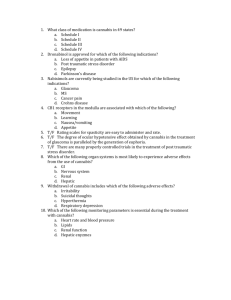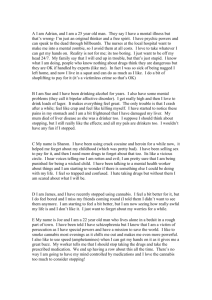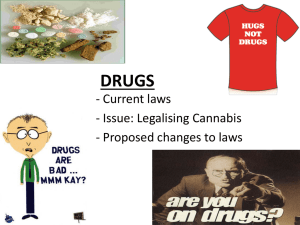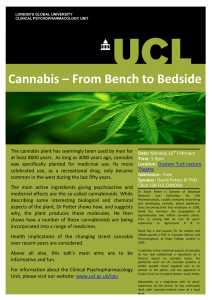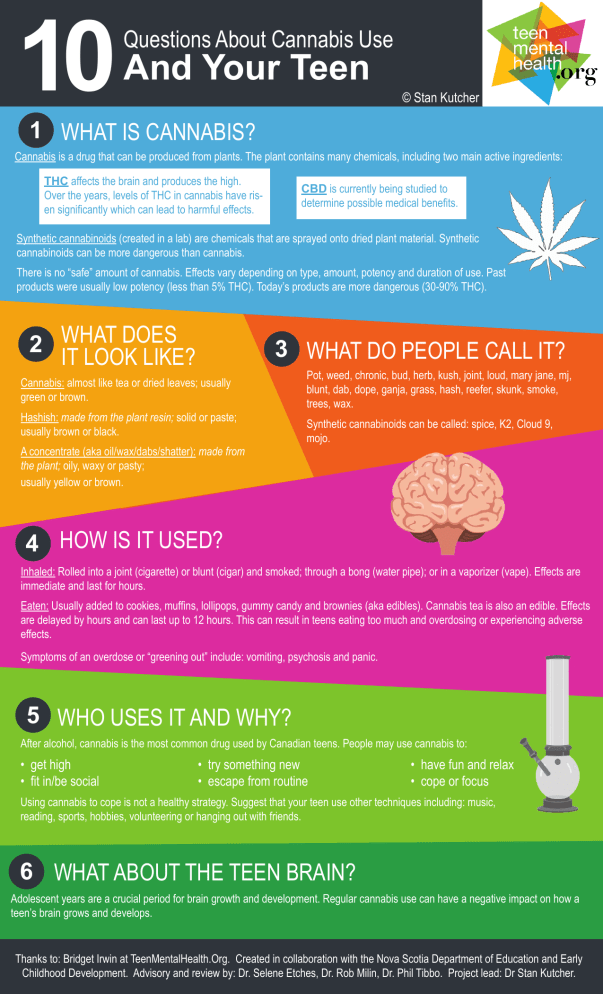
10 Questions About Cannabis Use And Your Teen © Stan Kutcher 1 WHAT IS CANNABIS? Cannabis is a drug that can be produced from plants. The plant contains many chemicals, including two main active ingredients: THC affects the brain and produces the high. Over the years, levels of THC in cannabis have risen significantly which can lead to harmful effects. CBD is currently being studied to determine possible medical benefits. Synthetic cannabinoids (created in a lab) are chemicals that are sprayed onto dried plant material. Synthetic cannabinoids can be more dangerous than cannabis. There is no “safe” amount of cannabis. Effects vary depending on type, amount, potency and duration of use. Past products were usually low potency (less than 5% THC). Today’s products are more dangerous (30-90% THC). 2 WHAT DOES IT LOOK LIKE? 3 WHAT DO PEOPLE CALL IT? Cannabis: almost like tea or dried leaves; usually green or brown. Hashish: made from the plant resin; solid or paste; usually brown or black. A concentrate (aka oil/wax/dabs/shatter): made from the plant; oily, waxy or pasty; usually yellow or brown. Pot, weed, chronic, bud, herb, kush, joint, loud, mary jane, mj, blunt, dab, dope, ganja, grass, hash, reefer, skunk, smoke, trees, wax. Synthetic cannabinoids can be called: spice, K2, Cloud 9, mojo. 4 HOW IS IT USED? Inhaled: Rolled into a joint (cigarette) or blunt (cigar) and smoked; through a bong (water pipe); or in a vaporizer (vape). Effects are immediate and last for hours. Eaten: Usually added to cookies, muffins, lollipops, gummy candy and brownies (aka edibles). Cannabis tea is also an edible. Effects are delayed by hours and can last up to 12 hours. This can result in teens eating too much and overdosing or experiencing adverse effects. Symptoms of an overdose or “greening out” include: vomiting, psychosis and panic. 5 WHO USES IT AND WHY? After alcohol, cannabis is the most common drug used by Canadian teens. People may use cannabis to: • get high • fit in/be social • try something new • escape from routine • have fun and relax • cope or focus Using cannabis to cope is not a healthy strategy. Suggest that your teen use other techniques including: music, reading, sports, hobbies, volunteering or hanging out with friends. 6 WHAT ABOUT THE TEEN BRAIN? Adolescent years are a crucial period for brain growth and development. Regular cannabis use can have a negative impact on how a teen’s brain grows and develops. Thanks to: Bridget Irwin at TeenMentalHealth.Org. Created in collaboration with the Nova Scotia Department of Education and Early Childhood Development. Advisory and review by: Dr. Selene Etches, Dr. Rob Milin, Dr. Phil Tibbo. Project lead: Dr Stan Kutcher. 7 WHAT ARE THE EFFECTS & SIGNS OF CANNABIS USE? Misinformation about cannabis is common. A recent national survey reports that about 70% of grade 12 students did not think regular cannabis use was harmful. The truth is that regular cannabis use can be harmful. Short-term effects: Long-term effects: • • • • • • • • • • • impaired cognitive function (attention, memory & problem solving) • lack of motivation • school drop-out/poor academic achievement • chronic bronchitis • increased risk for Anxiety Disorders, Mood Disorders, Psychotic Disorders & Cannabis Use Disorder (addiction) feeling relaxed, happy, high more sociable heightened & distorted perceptions decreased motor coordination impaired judgement & problem solving impaired memory & learning capability increased heart rate & body tremors anxiety or panic* psychotic symptoms* nausea & vomiting* *tend to occur with exposure to high doses or overdose. Note: Using cannabis together with other drugs/alcohol can increase negative effects. Negative long-term effects are more common when use begins before age 16, and when cannabis use is daily. The greater the dose & duration of cannabis use, the greater the negative impacts. Stopping regular & heavy cannabis use may not fully restore cognitive impairments. Effects on driving: • It is dangerous for a person to drive if they’ve used cannabis (cannabis doubles the risk of a fatal crash) • There’s no clear time limit to when negative impacts on driving performance decrease or stop • Tell your teen they shouldn’t get into a car driven by someone who’s used cannabis • Driving after using cannabis is illegal While it can be difficult to know if your teen is using cannabis, some possible signs include: • more withdrawn/secretive • periodically more gregarious/sociable • red eyes, cannabis scent on person • decline in academic performance • decrease in activities they used to enjoy • nausea, vomiting, anxiety symptoms, panic, paranoia • friend group using cannabis increases probability your teen will Cannabis can be addictive. Regular cannabis use can lead to Cannabis Use Disorder (CUD). About 12% of teens who start regular use of cannabis early will develop CUD. 8 WHAT SHOULD I DO IN AN EMERGENCY? (SJSS) If a young person has overdosed on cannabis (i.e. “greened out”), follow these steps: S J S S bring them to a safe place if they aren’t vomiting, give them lots of fruit juice if they’ve passed out, lie them on their side and call 911 if they’re panicky or paranoid, stay with them to provide reassurance and support Other steps: • If you’re uncomfortable with what’s happening, or suspect synthetic cannabinoid use, call 911 • Afterwards, have a frank, open and non-threatening discussion about your child’s cannabis use • If it isn’t your child, decide if and when to discuss the situation with their caregivers 9 HOW DO I TALK ABOUT CANNABIS USE? There’s a lot of misinformation about cannabis. Get informed, know the facts and TALK SMART. When speaking with your teen about cannabis: be open but not permissive; listen actively and respectfully; provide evidence-based information; help them choose healthy life options. Help your teen understand: • If they don’t want to use drugs, they are their own person and it’s their decision not to, even if their friends are. • They’re encouraged to educate themselves about cannabis to have evidence-based information Keep in mind: • Parents are role models for their children • Your own substance use and attitudes towards cannabis use will influence your child • Speak openly and clearly with your teen about cannabis use • Don’t wait until they start using the drug • You are their parent – not a peer 10 HOW DO I LEARN MORE? Visit teenmentalhealth.org/cannabis Show the site to your teen for materials they can access. TALK SMART about cannabis. www.teenmentalhealth.org/cannabis
